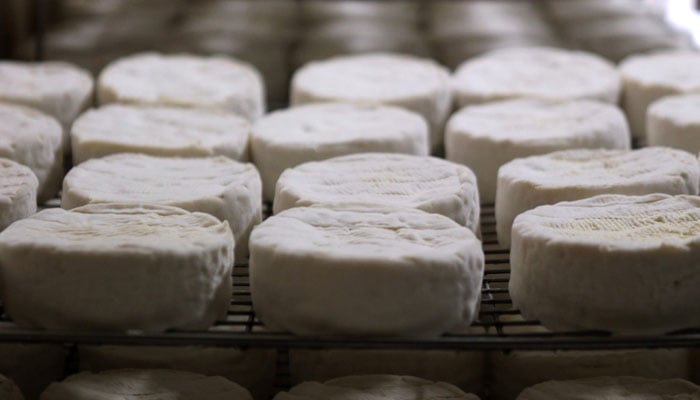Mozzarella, Feta, Ricotta, Cottage: Which cheese the healthiest?
Cheese is a fantastic source of calcium, protein, and a number of other nutrients
Cheese is a dairy product that is available in countless flavours and textures. It is made by adding acid or bacteria to the milk. The method of production and the type of milk used will affect the nutritional value and flavour of the cheese.
Many types of cheese, including feta, blue cheese, and mozzarella, can offer protein and other crucial nutrients. Some individuals worry that cheese has a lot of calories, sodium, and fat. However, cheese is a fantastic source of calcium, protein, and a number of other nutrients. Consuming cheese may even help with weight loss, heart health, and osteoporosis prevention.
However, some cheeses are more nutritious than others. Here are five of the healthiest types of cheese.
Mozzarella
Mozzarella is a soft white cheese with a high moisture content. It is typically produced using milk from Italian cows or buffaloes and has Italian origins. In comparison to most other cheeses, it has fewer calories and sodium.
Additionally, probiotic bacteria including Lactobacillus casei and Lactobacillus fermentum strains are present in mozzarella.
These probiotics may enhance gut health and regularity, boost immunity, and reduce inflammation, according to studies.
In a previous study, 200 millilitres (7 ounces) of fermented dairy containing Lactobacillus fermentum per day for three months was found to considerably shorten the duration of respiratory infections. The study involved 1,072 older persons.
Blue cheese
Blue cheese is made from milk from cows, goats, or sheep. It is aged using cultures derived from the mould Penicillium.
Typically, it is white with veins and dots that are blue or grey. The cheese is produced using Penicillium mould, which gives it a distinct flavour and strong, sour aroma.
Including blue cheese in your diet may help prevent problems with your bones because it is high in calcium.
Feta cheese
Greek natives made the soft, salty white cheese known as feta. It is usually made from sheep or goat milk. Feta from sheep's milk has a sour, strong flavour, whereas feta from goat's milk is subtle in taste.
Feta is wrapped in brine to keep it fresh. It has typically fewer calories than the majority of other cheeses.
Conjugated linoleic acid (CLA), which is present in feta and all full-fat dairy products, is linked to a number of advantages, including decreased body fat and other changes in body composition.
Taking 3 g of a CLA supplement daily for three months was linked to lower body fat mass and body fat percentage compared to a placebo, according to a small 2019 trial of 54 people with obesity.
Thus, eating CLA-containing foods such as feta may help reduce body fat.
Cottage cheese
Cottage cheese is a soft white cheese which is created from the loose curds of cow's milk. It is assumed that the United States is where it first appeared.
Cottage cheese is frequently suggested for weight loss because it contains a lot of protein and little calories.
According to several studies, consuming high-protein foods like cottage cheese might boost feelings of fullness and help people consume less calories overall, which may result in weight loss.
Researchers discovered that cottage cheese was equally as filling as an omelette with a similar nutritional make-up in a short 2015 trial involving 30 participants.
Including cottage cheese in your diet may increase your feeling of fullness after meals and help you consume fewer calories.
It tastes fantastic when spread on toast, added to scrambled eggs, mixed into smoothies, or used as the foundation for dips.
Ricotta cheese
Ricotta, an Italian cheese which is frequently compared to a lighter version of cottage cheese because of its creamy texture.
Whey, a milk protein that includes all the essential amino acids that people must obtain from food, makes up the majority of the protein in ricotta cheese.
Whey is readily absorbed and may aid in lowering blood pressure and cholesterol levels and promoting the growth of muscles.
Whey protein supplementation may reduce levels of triglycerides, total cholesterol, LDL (bad) cholesterol, and haemoglobin A1C, according to an analysis of 22 trials of people with metabolic syndrome and related diseases.
However, this analysis paid more attention to whey supplements than whey from dairy products. While ricotta might have comparable advantages, additional analysis of whey from complete foods is required.
Salads, scrambled eggs, pasta, and lasagna all taste great when made with ricotta cheese. The cheese can also serve as the foundation for creamy dips or be combined with fruit for a salty-sweet snack.
Whether it's genetic, psychological, or the result of upbringing or nature, our love for cheese is a passionate relationship that we hope will last forever.
-
Dolly Parton achieves major milestone for children's health advocacy
-
Everything we know about Bruce Willis frontotemporal dementia
-
Adele reveals how she 'snapped out of' sever postpartum depression
-
Gordon Ramsay on his basal cell carcinoma diagnosis
-
Inside Meghan Markle's 'scary' postpartum preeclampsia journey
-
James Hetfield's health struggle amid his 2026 Las Vegas Sphere Residency
-
Lamar Odom details struggle with addiction and ‘amazing’ rehab experience
-
Hilary Duff details how she protected her children’s mental health amid divorce












